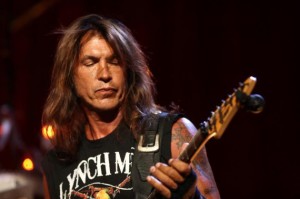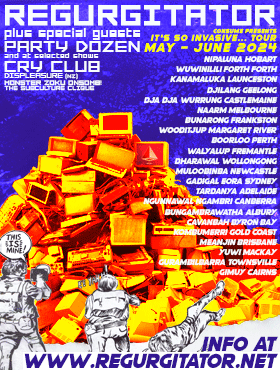GEORGE LYNCH
August 29, 2006 | Author: Joe Matera
 Emerging out of LA’s then exploding ‘80s Sunset Strip scene, George Lynch etched himself into the rock guitar playing annals via the hugely successful hard rock combo Dokken. His intensely rapid fire style and unique approach earned him the title of ‘Mr. Scary’. Upon exiting the band, he went on to form Lynch Mob as well as carving himself a successful solo career in his own right. On a recent guitar clinic jaunt to Australia to showcase his new signature ESP guitar, Joe Matera caught up with Lynch after an in-store in Melbourne for some “guitar talk”
Emerging out of LA’s then exploding ‘80s Sunset Strip scene, George Lynch etched himself into the rock guitar playing annals via the hugely successful hard rock combo Dokken. His intensely rapid fire style and unique approach earned him the title of ‘Mr. Scary’. Upon exiting the band, he went on to form Lynch Mob as well as carving himself a successful solo career in his own right. On a recent guitar clinic jaunt to Australia to showcase his new signature ESP guitar, Joe Matera caught up with Lynch after an in-store in Melbourne for some “guitar talk”
How has your guitar playing expanded from the early days?
I think my guitar playing has done two things, I think it’s expanded and contracted at the same time. So in my quest for evolving I seemed to have devolved, kind of full circle to where I started. There is a track on my Lost Lynch album that I did recently. The track is the first thing I ever recorded when I was 17 at the time. And though it’s terrible and it’s some friend’s band, I thought it was interesting listening back to it as I really haven’t changed fundamentally that much. And that’s been like 30 something years ago. I think the essence of your playing is either there or not there. You either maintain or loose the essence of who you basically are.
You’ve been a solo artist for a while now so in that sense has that helped you come to a full realisation of who you as a guitar player?
I hope not because when the quest is complete, the game’s over.
It’s akin to those that say can master the instrument, but I disagree as you can’t really master an instrument, it’s unlimited…
It’s not an instrument that you master it’s sort of achieving this inner kind of thing that is illusive. I’d imagine it’s the same for other musicians too. You kind of hear this thing in your head, this vision, this ideal musical kind of epic journey which has been formed in you head for as long as you can remember. For me I’ll be riding my motorcycle somewhere and it always happens, I’ll sort of imagine and play something in my head and imagine it playing it live or in the studio or somewhere yet I will never ever achieve that ideal performance. The reality never comes close to the kind of conjured up imaginative thing that I’ve got. It’s this illusive goal.
I hear you have a signature Randall amp coming out that is based on two of your favourite Marshall heads from the ‘60s?
Yes a ’67 and a ’68 Plexi. I wouldn’t say it’s based on those totally but I created four modules [the Super V, Brahma, Mr. Scary, and the Grail] and the Brahma module is based on the ’68 head which indeed is my favourite Marshall head. The cabinet is loosely based on a late ‘60s Hi Watt bass cabinet with 12” cast-frame speakers created with custom Eminence and the construction of the cabinet is similar to the Hi Watt. The power amp in the “Lynch Box” is basically a Marshall setup with all the bells and whistles.
So what other projects and gear are in the works?
Gear wise I’ve got a new ESP guitar called a Super V that contains a new pick up I designed with Seymour Duncan also called the Super V pickup. Dean Markley and I have got together too and designed a new string also called Super V strings, which is vintage high nickel content wounded pitch strings. I’ve got some pedal things thats going on in the mix right now going on too, but it’s too early to say much about. I’m also working on a new record with the drummer from Disturbed and the bass player from Shadows Fall that will be coming out hopefully at the end of the year.
Your original J.Frog Skull ‘n’ Bones and Kramer guitars, have you retired them?
Yes, that original Skull ’n’ Bones guitar is hanging in the Hard Rock café in Hollywood. The Kramer, I have no idea where it is today.
If players wanted to go about capturing the definite Lynch tone, what advice would you give them?
Well capturing my sound is like me trying to capture somebody else’s sound. I’m more of slave to my gear. I don’t see myself much of a style player like Randy Rhoads or Eddie Van Halen. I’m more of a gear eccentric guy.
Speaking of Randy Rhoads, he once said in an interview that you were at the time the most dangerous player on the Strip and better than Van Halen, who eventually overshadowed you and everybody else…
It’s not the way I see it. I think we were all in Eddie’s shadow. When Eddie emerged it was this ripple effect that went through LA and soon all this melodic playing came to the fore. In retrospect, there was nobody as good or better really as everybody was trying to be different. And Eddie was different which is what I loved about that era in Hollywood at the time especially the period from the mid ‘70s up until to early ’80.s. There was this great differentiation and uniqueness with all the players. Nobody was basing their style on or copying somebody else, they were doing their own thing. I was doing my own thing, Randy was doing his own thing and Eddie was doing his own thing.


